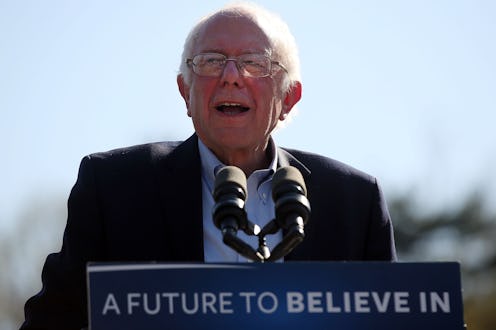News
Sanders Ties Clinton In National Polls, But ...
A new Wall Street Journal/NBC poll shows Bernie Sanders within two points of Hillary Clinton in national polls. He trails her 48 to 50 percent, but the poll has a 5-point margin of error, so that's essentially a tie. Make no mistake: National polls show Sanders closing the gap with Clinton. But from a practical standpoint, that doesn't really matter.
The reason it doesn't matter is that the Democratic Party does not hold a national primary to determine its presidential nominee. It holds a series of statewide primaries and caucuses, and the majority of those statewide votes have already been held. Out of all the pledged delegates available, over half have already been allocated, and Clinton has won more of them than Sanders.
This isn't to say that "the will of the people" doesn't matter. The fact that such a huge chunk of the Democratic base supports Sanders is hugely significant in a way that transcends this election or its results. Sanders is catalyzing what I suspect will be a sea change in the Democratic Party and its principles. His sustained, strong national poll numbers amongst Democrats are proof of this, and the party will almost certainly move to the left due to his influence on it. That's a big deal.
Nevertheless, the way that you become the Democratic nominee is by winning the most delegates, and Clinton still has 200 more delegates than Sanders. The fact that he's drawn her to a tie in national polls will do nothing to close this gap, because the delegates that haven't already been awarded will be allocated based on statewide votes, not a national one.
Sanders supporters might argue that a strong national standing will have a trickle-down effect, or that it's indicative of growing support for Sanders in states that have yet to vote. But there's really no reason to believe this. First of all, it's more likely that his growing national support is coming from states that already voted, simply because there are more states that have already voted. Secondly, Clinton is still well ahead of Sanders in the state polls that matter the most, namely New York and California.
Moreover, as the wildly divergent result of this primary have shown, the states don't vote in accordance with any one metric — let alone national polls. The same day Sanders won Minnesota by 23 points, Clinton defeated him by 29 points in Virginia. We wouldn't be seeing results like that if state results tracked with national polls.
There is, however, one scenario in which Sanders' national poll numbers could tip the race, and that's if Democrats have a contested convention. In such a scenario, superdelegates would probably end up deciding the nomination. It's not inconceivable that they, or a majority of them, would look at the national polls, determine that Sanders is the future of the Democratic Party, and toss their votes to him instead of Clinton.
Until it becomes clear the convention will be contested, though, it's best to look at the state polls, not national ones. Sanders' national poll numbers do say a lot about where the Democratic Party is headed, and where it isn't. They will not, however, have an effect on who becomes the Democratic nominee in 2016.
